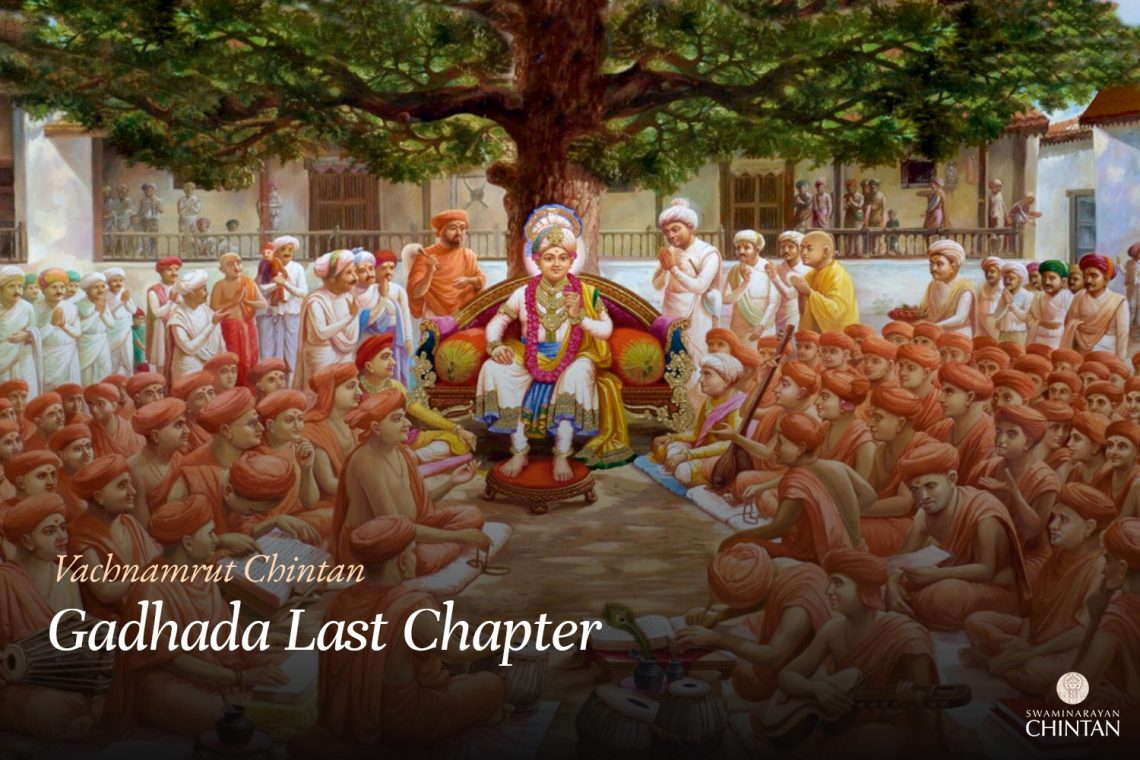Central Insights:
- Miraculous aspects of the path to ultimate liberation (Kalyan).
Key Points:
- One must not harbor any form of maan (ego or pride) before Bhagwan or His bhakto (devotees).
- Avoid finding avgun (faults) in Bhagwan and His devotees.
- Do not develop excessive attachment toward relatives.
Explanation:
This Vachanamrut is referred to as the “Miraculous Discourse.” A karamat (miracle) is an extraordinary event, such as a potent medicine producing incredible results or someone demonstrating supernatural abilities, like clairvoyance or telepathy. The process may remain incomprehensible, but its outcomes astonish everyone. Similarly, Maharaj’s teachings in this Vachanamrut produce miraculous effects. What are these teachings?
First, Maharaj explains that one who desires their kalyan (ultimate good) should avoid harboring maan of any kind before Bhagwan and His bhakto. This maan could stem from being born in a high-ranking royal family, a sacred Brahmin lineage, wealth, beauty, or scholarly accomplishments. Yet, such pride must be entirely abandoned. One must humbly become a das-anudas (servant of the servants) of poor Satsangis (followers of the holy fellowship) and santo (saints).
If pride arises or humility diminishes, miraculous consequences unfold. If maan is present, even if a person possesses remarkable virtues, favorable circumstances for liberation, and abundant resources, they may, miraculously, descend toward Yampuri (hell). Conversely, if one humbly surrenders to Bhagwan and His bhakto with simplicity and poverty of spirit, miracles also occur, leading them rapidly to liberation, even surpassing others equipped with significant resources for the same.
The second point is that finding avgun in Bhagwan and His devotees also results in miraculous consequences. Maharaj compares avgun to the saliva of a rabid dog. When a regular dog bites, a lengthy course of injections is required, often administered to the navel. Without this treatment, the rabies infection might manifest unpredictably. A rabid dog’s bite is far worse—it inevitably spreads rabies to others. Such a dog lives only to infect others it encounters.
Similarly, Maharaj says that the habit of finding avgun in Bhagwan and His devotees works just like this rabid dog analogy—it is powerfully destructive. No amount of remedies can counteract this habit. On the other hand, developing the tendency to see virtues can work miracles on the path to kalyan. Maharaj emphasizes that finding avgun in Bhagwan and His devotees is the greatest sin, with no means of atonement. It leads to the complete destruction of one’s soul (jiv), leaving no possibility of redemption.
Lastly, Maharaj explains the third point: one must not develop excessive attachment (het) toward relatives. Such attachment
produces effects as miraculous as the first two points but in a negative way. Maharaj provides an analogy: milk sweetened with sugar can still become fatal if tainted with a serpent’s venomous saliva. Although the milk appears sweet and harmless, the poison remains unseen and deadly. Likewise, attachment to relatives might feel sweet within the heart and appear socially acceptable. However, its catastrophic results emerge later, and no remedy exists at that point.
Maharaj says that one who desires their kalyan must avoid excessive attachment to relatives. Instead, they should cultivate detachment from worldly affairs, develop love for the charanarvind (lotus-like feet) of Bhagwan, and engage in His bhajan (devotional worship).
The miraculous effects of these three teachings ensure that no obstacles hinder the path to kalyan.
Glossary
| Kalyan – liberation from the cycle of birth and death and reaching divine abode of God. |
| Maan – Pride A sense of superiority or self- importance that can separate one from humility and devotion to God. |
| Avgun – Faults or flaws |
| Das-anudas – Servant of the servants |
| Bhakto – Devotees |
| Yampuri – Hell |
| Satsang – Holy fellowship |
| Het – Love or affection A deep emotional connection, especially in devotion to God or others. |
| Charanarvind – Lotus-like feet of Bhagwan |
| Bhajan – Devotion |
| Karamat – Miracle An extraordinary or incomprehensible outcome resulting from Bhagwan’s teachings or grace. |
| Rabid Dog Analogy – Symbol of destructive tendencies Describes how the habit of finding faults in Bhagwan or His devotees spreads negativity and leads to spiritual ruin. |

